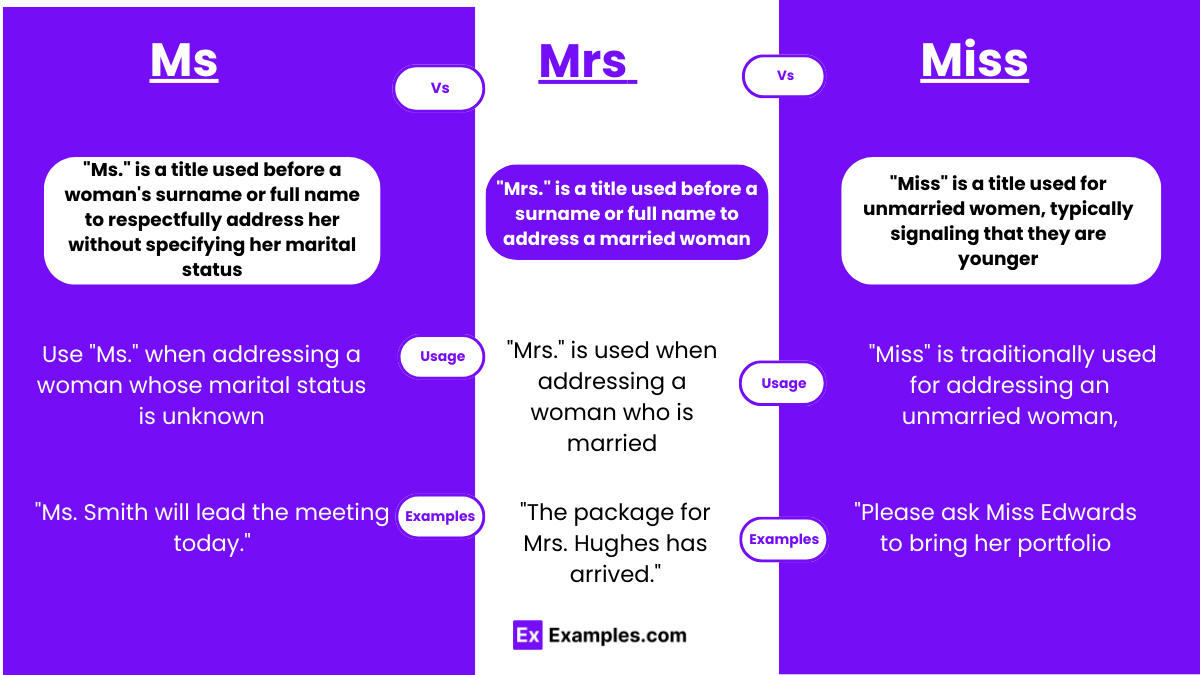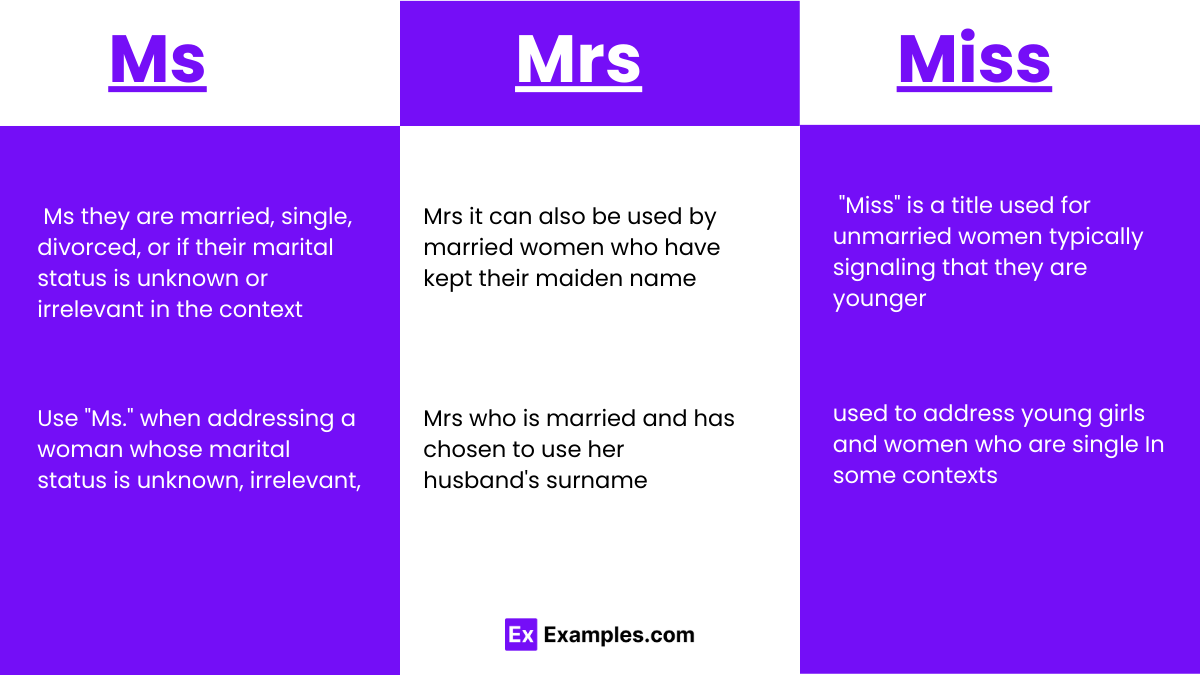Ms vs Mrs vs Miss – Examples, Difference, Usage, How to use
When addressing women and young girls, the choice of title — Miss, Ms., or Mrs.— carries importance in acknowledging marital status and personal preference. “Miss” is traditionally used for unmarried young women and girls, typically those under the age of 30. For situations where a woman’s marital status is unknown, if she is unmarried and older than 30, or if she expresses a preference for a title that doesn’t denote marital status, “Ms.” is the appropriate choice. “Mrs.” is reserved for women who are married and have chosen to adopt their husband’s surname or wish to be identified by their marital status. These distinctions in titles are not merely formalities but are respectful nods to personal identity, marital status, and societal roles.
Ms vs Mrs vs Miss – Meaning
Ms Meaning: “Ms.” is a title used before a woman’s surname or full name to respectfully address her without specifying her marital status. It is a modern and neutral form of address that is suitable for all women, regardless of whether they are married, single, divorced, or if their marital status is unknown or irrelevant in the context. It’s particularly favored in professional settings.
Mrs Meaning: “Mrs.” is a title used before a surname or full name to address a married woman, traditionally indicating that she has taken her husband’s last name. However, it can also be used by married women who have kept their maiden name, preceded by their husband’s name (e.g., Mrs. Smith Jones). This title is specifically linked to marital status and is used to acknowledge a woman’s marriage.
Miss Meaning: “Miss” is a title used for unmarried women, typically signaling that they are younger, although age is not a strict determinant. It has been traditionally used to address young girls and women who are single. In some contexts, it can be used to emphasize or inquire about the marital status of a younger woman
Summary: The titles Miss, Ms., and Mrs. serve as indicators of a woman’s marital status and personal choice. Use “Miss” for young, unmarried women, “Ms.” when marital status is unknown or for unmarried women over 30, and “Mrs.” for married women. These titles reflect respect for personal identity.
How to pronounce Ms vs Mrs vs Miss
Ms.: Pronounced /ˈmɪz/ — It sounds similar to “miz,” rhyming with “biz.” This title is a neutral form of address that does not indicate marital status.
Mrs.: Pronounced /ˈmɪsɪz/ — It starts with a sound similar to “miss” and adds an “iz” at the end, sounding like “missiz.” This title is used for married women.
Miss: Pronounced /ˈmɪs/ — It is simply pronounced as it looks, with a single syllable sounding like “miss,” rhyming with “this” and “kiss.” This title is used for unmarried women.
Differences between Ms vs Mrs vs Miss
| Title | Pronunciation | Usage | Indicates |
|---|---|---|---|
| Ms. | /ˈmɪz/ | For any woman, regardless of marital status. Preferred in professional settings or when marital status is unknown or considered irrelevant. | No indication of marital status; a neutral and modern form of address. |
| Mrs. | /ˈmɪsɪz/ | For married women, traditionally those who take their husband’s last name, but also used by women who have retained their maiden name after marriage. | Indicates that a woman is married. |
| Miss | /ˈmɪs/ | For unmarried women, often used to address young girls and women who are single. | Indicates that a woman is single and unmarried. |
How to Use Miss vs Mrs vs Miss
Ms.: Use “Ms.” when addressing a woman whose marital status is unknown, irrelevant, or when you wish to address her in a manner that does not denote her marital status. It’s widely accepted in professional and formal settings.
Mrs.: “Mrs.” is used when addressing a woman who is married and has chosen to use her husband’s surname, or if you know the woman prefers this title. It acknowledges the woman’s marital status.
Miss: “Miss” is traditionally used for addressing an unmarried woman, particularly younger women and girls. It can imply that the woman is single.
Ms vs Mrs vs Miss Examples
Ms.
- “I will email Ms. Johnson the report by this afternoon.”
- “Ms. Smith will lead the meeting today.”
- “Please welcome Ms. Gomez, our guest speaker.”
- “Ms. Patel has made significant contributions to our project.”
- “Could you ask Ms. Thompson to call me back?”
Mrs.
- “Mrs. Robinson will be joining our board of directors next month.”
- “Please, let Mrs. Martinez know her table is ready.”
- “The package for Mrs. Hughes has arrived.”
- “Mrs. Bennett’s philanthropic efforts have been commendable.”
- “Can you confirm if Mrs. Dawson will attend the gala?”
Miss
- “Miss Carter is the new intern in the marketing department.”
- “Have you met Miss Green, the art teacher?”
- “Miss Wilson’s design was chosen for the project.”
- “Please ask Miss Edwards to bring her portfolio.”
- “Miss Thompson’s solo performance will close the event tonight.
Synonyms For Ms vs Mrs vs Miss
| Title | Alternatives/Similar Expressions |
|---|---|
| Ms. | Woman, Lady, Female (in contexts where titles are not required) |
| Mrs. | Madam (in formal address, though less specific) |
| Miss | Young Lady, Girl (in contexts emphasizing youth or singleness) |
Exercise
Ms. vs. Mrs. vs. Miss: Fill in the blanks questions
- _______ Smith will be the keynote speaker at the conference next month.
- Please forward the invoice to _______ Johnson at the finance department.
- _______ Brown requested an early check-out from the hotel.
- The invitation should be addressed to _______ and Mr. Thompson for the charity ball.
- _______ Davis was the first woman in her family to graduate from law school.
- _______ Lee teaches the advanced ceramics class on Wednesdays.
- The reservation at the restaurant is under the name of _______ Green.
- _______ Watson has published several articles on renewable energy sources.
- The package was delivered to _______ Morgan’s office this morning.
- _______ Rivera will be joining the company as the new CFO next quarter.
Answers
- Ms.
- Ms.
- Mrs.
- Mrs.
- Miss
- Ms.
- Miss
- Ms.
- Mrs.
- Ms
FAQ’S
Is Miss or Ms more professional?
Ms. is generally considered more professional in the workplace and formal settings. It is used regardless of marital status, providing a way to address women without referring to their marital status, which aligns with modern professional standards of equality and respect.
Is it Miss, Mrs., or Ms. after divorce?
Ms. is the most appropriate title to use for a woman after divorce. While Mrs. can still be used if she keeps her married name and prefers it, Ms. offers a neutral option that doesn’t indicate marital status. Miss is typically not used for a divorced woman unless it is her specific preference.
Is it Ms. or Miss if married?
A married woman can be addressed as Ms. if she prefers not to disclose her marital status or seeks a neutral form of address. Miss is traditionally used for unmarried women and is less common for married women, unless it’s their preference. The choice between Ms. and Miss often depends on personal preference.
Should I use Miss or Ms.?
The choice between Miss and Ms. should be guided by the woman’s personal preference. If unknown, Ms. is a safe and respectful choice as it is marital-status neutral and professionally accepted. Use Miss when you know the woman prefers this title or in contexts where it’s traditionally appropriate, such as for young girls.




